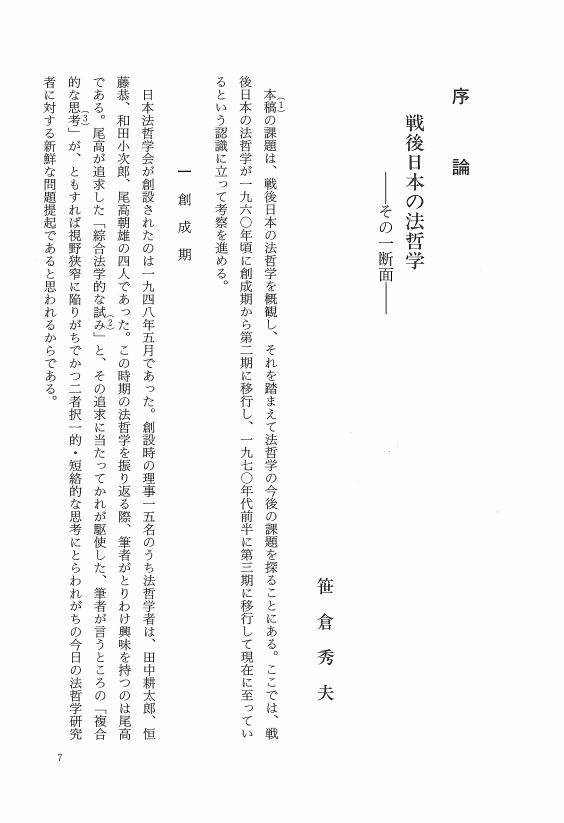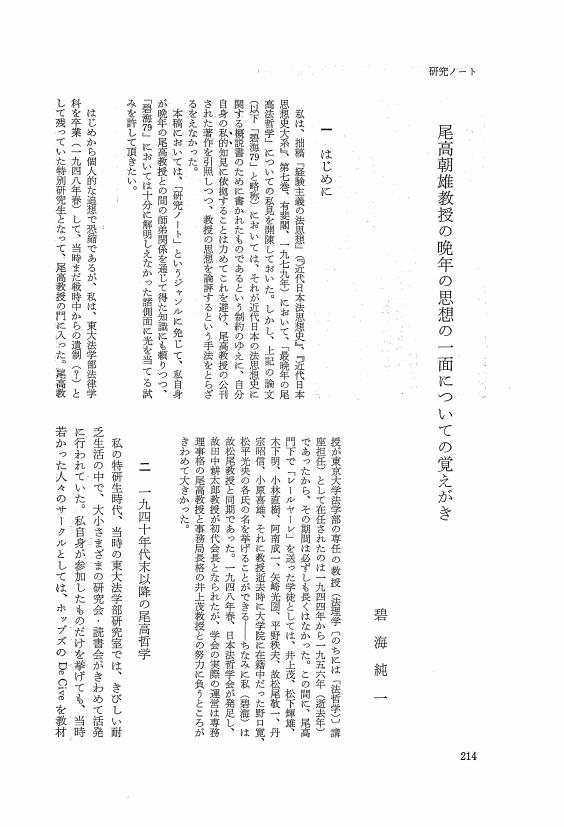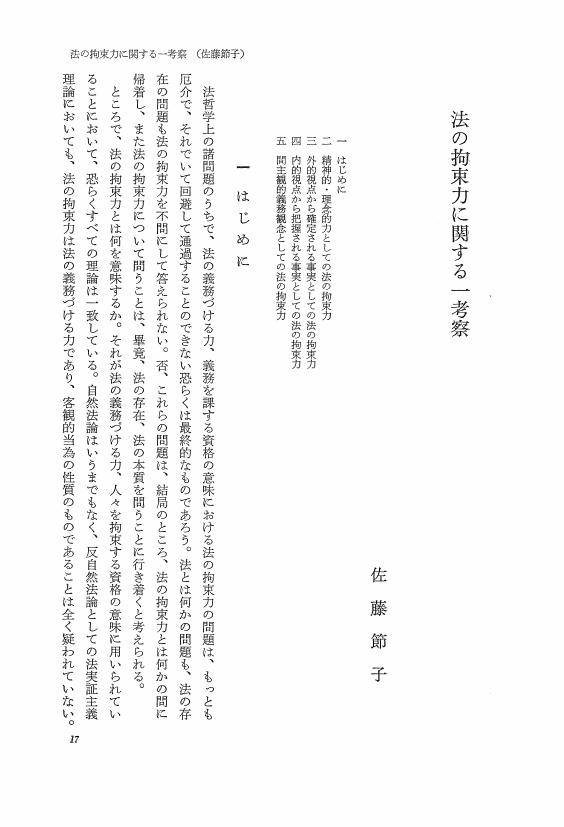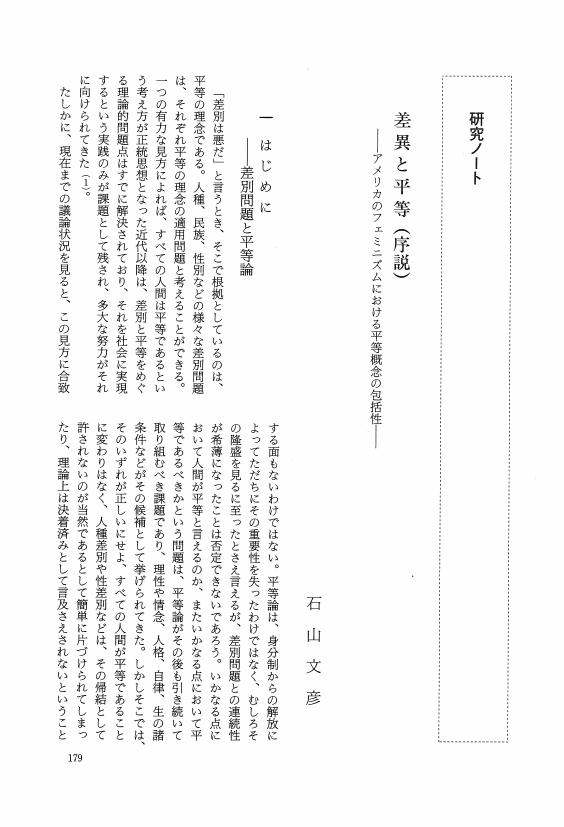5 0 0 0 OA 人間の生命の始まりと生命倫理学
- 著者
- 森岡 正博
- 出版者
- 日本法哲学会
- 雑誌
- 法哲学年報 (ISSN:03872890)
- 巻号頁・発行日
- vol.1993, pp.19-24, 1994-10-30 (Released:2008-11-17)
5 0 0 0 OA ジョン・ロールズの「公正としての正義」論
- 著者
- 田中 成明
- 出版者
- 日本法哲学会
- 雑誌
- 法哲学年報 (ISSN:03872890)
- 巻号頁・発行日
- vol.1972, pp.161-203, 1973-10-30 (Released:2008-11-17)
- 参考文献数
- 9
5 0 0 0 OA 遵法責務論と法の規範性-ソウパーの議論を手掛かりに
- 著者
- 横濱 竜也
- 出版者
- 日本法哲学会
- 雑誌
- 法哲学年報 (ISSN:03872890)
- 巻号頁・発行日
- vol.2002, pp.193-201, 2003-10-20 (Released:2008-11-17)
- 参考文献数
- 6
5 0 0 0 OA 戦後日本の法哲学—その一断面—
- 著者
- 笹倉 秀夫
- 出版者
- 日本法哲学会
- 雑誌
- 法哲学年報 (ISSN:03872890)
- 巻号頁・発行日
- vol.1998, pp.7-27, 1999-10-30 (Released:2008-11-17)
- 参考文献数
- 38
5 0 0 0 OA 法実証主義の再検討
- 著者
- 矢崎 光圀
- 出版者
- 日本法哲学会
- 雑誌
- 法哲学年報 (ISSN:03872890)
- 巻号頁・発行日
- vol.1962, pp.63-113, 1963-04-20 (Released:2009-02-12)
- 参考文献数
- 96
5 0 0 0 OA ヘーゲルからマルクスヘ
- 著者
- 猪木 正道
- 出版者
- 日本法哲学会
- 雑誌
- 法哲学四季報 (ISSN:24338583)
- 巻号頁・発行日
- vol.1951, no.7-8, pp.265-290, 1951-02-05 (Released:2008-11-17)
- 参考文献数
- 57
4 0 0 0 OA 法の概念規定についての若干の論理学的、方法論的考察
- 著者
- 加藤 新平
- 出版者
- 日本法哲学会
- 雑誌
- 法哲学年報 (ISSN:03872890)
- 巻号頁・発行日
- vol.1963PartI, pp.1-62, 1963-12-20 (Released:2009-02-12)
- 参考文献数
- 131
4 0 0 0 OA 何のための法の支配か 法の闘争性と正統性
- 著者
- 井上 達夫
- 出版者
- 日本法哲学会
- 雑誌
- 法哲学年報 (ISSN:03872890)
- 巻号頁・発行日
- vol.2005, pp.58-70,198, 2006-10-30 (Released:2010-02-15)
- 参考文献数
- 14
The present paper reconstructs the idea of rule of law as a response to the persistence of human conflicts and defends it against the criticism that it hides and speciously rationalizes the rule of men. It is pointed out that Hobbes, who correctly rejected Coke's perception of rule of law as a groundless defense of social tyranny of feudal powers including religious forces, provided a deep insight into the problem of human conflicts which even the Hobbesian social contract cannot overcome. This insight is developed by arguing that the establishment of the state as a collective decision making system and enforcement mechanism cannot prevent the persistent human con-flicts from degenerating into the violent clashes in the state of nature unless the state's power structure is subjected to the governance of the principles which enables the losers of the strife in political decision making process to accept its outcomes as something beyond the victor's justice and pay deference to the winners. The rule of law is reinterpreted and defended as constituting the governance of such principles. This implies that the rule of law constitutes the conditions of the legitimacy of law as distinguished form its rightness. A further elaboration of this point is given by showing that Jeremy Waldron's normative-positivist defense of the dignity of democratic legislation as a response to “the circumstances of politics” helps to clarify the distinction between the legitimacy and rightness of law although it fails to solve the question of what constitutes the conditions of legitimacy. It is concluded that an adequate answer to this question is provided by the “strong structural interpretation” of rule of law. The rule of law on this interpretation protects the proto-right to justice-review of the outcomes of constitutional as well as legislative strife and subjects them to the test of the universalizable and reversible justification which underlies competing conceptions of justice as their common conceptual core.
4 0 0 0 OA ナチズムにおけるね法体制の変動 フレンケル『二重国家』を中心に
- 著者
- 舟越 耿一
- 出版者
- 日本法哲学会
- 雑誌
- 法哲学年報 (ISSN:03872890)
- 巻号頁・発行日
- vol.1988, pp.62-78, 1989-10-30 (Released:2008-11-17)
- 参考文献数
- 25
4 0 0 0 OA ルターと自然法の問題 後期スコラ思想との関連で
- 著者
- 伊藤 平八郎
- 出版者
- 日本法哲学会
- 雑誌
- 法哲学年報 (ISSN:03872890)
- 巻号頁・発行日
- vol.1991, pp.127-134, 1992-10-30 (Released:2008-11-17)
- 参考文献数
- 23
4 0 0 0 OA 尾高朝雄教授の晩年の思想の一面についての覚えがき
- 著者
- 碧海 純一
- 出版者
- 日本法哲学会
- 雑誌
- 法哲学年報 (ISSN:03872890)
- 巻号頁・発行日
- vol.1979, pp.214-222, 1980-10-30 (Released:2008-11-17)
- 参考文献数
- 21
4 0 0 0 OA 法の拘束力に関する一考察
- 著者
- 佐藤 節子
- 出版者
- 日本法哲学会
- 雑誌
- 法哲学年報 (ISSN:03872890)
- 巻号頁・発行日
- vol.1977, pp.17-51, 1978-11-20 (Released:2008-11-17)
- 参考文献数
- 58
3 0 0 0 OA 法的思考とイデオロギー 法内在的イデオロギーについての一試論
- 著者
- 田中 成明
- 出版者
- 日本法哲学会
- 雑誌
- 法哲学年報 (ISSN:03872890)
- 巻号頁・発行日
- vol.1981, pp.17-41, 1982-10-30 (Released:2008-11-17)
- 参考文献数
- 27
3 0 0 0 OA 公開性としての公共性—情報公開と説明責任の理論的意義—
3 0 0 0 OA 法実証主義の再検討
- 著者
- 木村 龜二
- 出版者
- 日本法哲学会
- 雑誌
- 法哲学年報 (ISSN:03872890)
- 巻号頁・発行日
- vol.1962, pp.1-30, 1963-04-20 (Released:2009-02-12)
- 参考文献数
- 43
3 0 0 0 OA 差異と平等(序説) アメリカのフェミニズムにおける平等概念の包括性
- 著者
- 石山 文彦
- 出版者
- 日本法哲学会
- 雑誌
- 法哲学年報 (ISSN:03872890)
- 巻号頁・発行日
- vol.1989, pp.179-188, 1990-08-25 (Released:2008-11-17)
- 参考文献数
- 10
3 0 0 0 OA 戦後「近代化」と知識人の「主体性」
- 著者
- 住吉 雅美
- 出版者
- 日本法哲学会
- 雑誌
- 法哲学年報 (ISSN:03872890)
- 巻号頁・発行日
- vol.1998, pp.44-58, 1999-10-30 (Released:2008-11-17)
- 参考文献数
- 36
3 0 0 0 OA H.L.A.ハートの「法の概念」について
- 著者
- 田丸 実
- 出版者
- 日本法哲学会
- 雑誌
- 法哲学年報 (ISSN:03872890)
- 巻号頁・発行日
- vol.1962, pp.137-151, 1963-04-20 (Released:2009-02-12)
- 参考文献数
- 18
3 0 0 0 OA もう一度ラートブルフを読み直す
- 著者
- 足立 英彦
- 出版者
- 日本法哲学会
- 雑誌
- 法哲学年報 (ISSN:03872890)
- 巻号頁・発行日
- vol.2003, pp.157-166,229, 2004-10-20 (Released:2008-11-17)
- 参考文献数
- 17
Gustav Radbruch (1878-1949) presented his famous formula under the direct influence of 12 years of National Socialism. It reads: “Where there is not even an attempt at justice, where equality, the core of justice, is deliberately betrayed in the issuance of positive law, then the statute is not merely ‘false law’; it completely lacks the very nature of law.” Many scholars claim that this proposition differs from the legal philosophy expressed in his earlier works. I will argue that his legal philosophy has commonly been misinterpreted in such a way that it is apparently inconsistent with this proposition, and that when correctly interpreted, it supports the proposition. The reinterpretation presented in this paper is based on two arguments. The first concerns Radbruch's concept of law. Many scholars believe that Radbruch developed his concept of law with reference to Heinrich Rickert's “value-reference”, according to which any false statute is acknowledged as “law”. However, I will argue that Radbruch developed this concept under the guidance of Emil Lask's teleological principle. The second argument concerns Radbruch's theory about the purposes of law, and his closely interrelated notion of relativism. I will present a manuscript that Radbruch wrote for his lecture at the University of Kiel in 1919 (Gustav Radbruch. Rechtsphilosophische Tagesfragen [Current Questions of Legal Philosophy]. Ed. Hidehiko Adachi and Nils Teifke. Nomos-Verlag: Baden-Baden 2004). In this manuscript, Radbruch gave preference to what he called the “transpersonal view”, in which personality values and collective values (i. e., the values of nations) are subservient to work values. However, he added to this the argument that personalities and nations are at the same time the precondition of any true community of work. In addition, relativism, from which standpoint he developed his theory before 1919, is critically described in this paper. Pursuant to this, I will maintain that his legal philosophy after 1919 should be reinterpreted as non-relativistic and that, as argued in his proposition, any statute that completely denies one of three given values is non-law.
3 0 0 0 OA ストア派人間観について オイケイオーシス論を中心に
- 著者
- 青野 透
- 出版者
- 日本法哲学会
- 雑誌
- 法哲学年報 (ISSN:03872890)
- 巻号頁・発行日
- vol.1984, pp.154-164, 1985-10-20 (Released:2008-11-17)
- 参考文献数
- 61

















